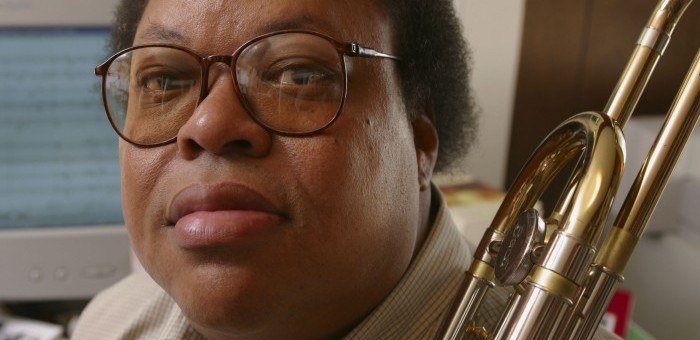Dec 9, 2025 12:28 PM
In Memoriam: Gordon Goodwin, 1954–2025
Gordon Goodwin, an award-winning saxophonist, pianist, bandleader, composer and arranger, died Dec. 8 in Los Angeles.…

George Lewis is featured on the album The Kitchen Improvisers 1976–1983.
(Photo: Courtesy of MacArthur Foundation)George Lewis’ concert at The Kitchen in Manhattan on Feb. 9 put the spotlight on an archival album that’s not entirely his. The Kitchen Improvises 1976–1983 (Orange Mountain Music) features a long and wonderful solo trombone track by Lewis alongside vintage recordings of performances by other revered artists, including percussionist Gerry Hemingway, multi-instrumentalist Earl Howard, saxophonist Oliver Lake and reedist Roscoe Mitchell.
But Lewis compiled the collection and, in a sense, compiled himself and eight other artists into an evening of improvisation styled after the late British guitarist Derek Bailey’s revered Company nights. The role wasn’t unfamiliar to Lewis, who was The Kitchen’s music director from 1980–’82, but on this night he kept his emcee duties to a minimum. “I used to do this here at the Kitchen,” he told the audience with characteristic humility. “I think I’ve forgotten how to do it.”
The evening opened with sound artist Andrea Parkins and composer-improviser Lucie Vítková, both of whom had their accordions on hand. There’s a beautiful fragility to Vítková’s recordings, and her improvised passages demonstrated a similar delicateness, with quick notes passing by almost like happenstance. Parkins used her accordion primarily for surface sounds to be looped and processed.
Keyboardist/saxophonist Howard, clarinetist Michael Lytle and vocalist and patron Thomas Buckner made for a fluid trio with Howard setting up and taking down sonic scrims while Buckner and Lytle engaged in rapid dialogue.
The conversation grew more engaged in a duet by Lake and composer-performer Miya Masaoka, which proved to be the most interwoven improvisation of the evening. Masaoka bowed the strings of her amplified koto (a traditional Japanese stringed instrument) as Lake switched between alto and curved soprano saxophones, his playing fitting into the crevices and pushing its way back out as she laid into the thick strings.
Lewis first took the stage as a player with sound artist (and former DNA drummer) Ikue Mori, the two benefitting from the most shared experience of the duos. Mori’s sound choices are unmistakable, inextricably linked to her musical training as a percussionist. Lewis circled her with tonality, occasional recorded voices and some surprisingly deep bass, keeping one eye toward her, always responding, circling and responding again.
The cast thusly introduced, Lewis called larger groups for the second half. First came himself (on trombone now) with Lake, Vítková and Howard, the latter again behind and below the ensuing thicket. Buckner, Lytle, Masaoka, Mori and Parkins then played the most abstract and volatile piece of the evening, with Masaoka using a metal bowl as a sustain-inhibiting slide.
Addressing the audience again, Lewis stepped momentarily into professorial mode. “Somehow over the last 40 years this idea has developed, you have small groups and then you put everyone up there to play,” he said. “I used to do this a lot with Derek Bailey. Somebody would say, ‘Let’s all play together,’ and he’d say, ‘That never works.’ But we’d try it anyway and he was right: It didn’t work.”
The comment drew laughs and, perhaps, broke a jinx. The nonet proved to be the strongest part of the night. Every performer felt subdued and respectful of the process, with Buckner, Masaoka or Lake only occasionally rising to the surface. The group eventually made its way toward a slow pulse without entirely conforming to it.
The program couldn’t, of course, represent 40 years of improvisation in about 90 minutes, but it did represent three generations, three nationalities, two genders and a variety of ethnicities. It also represented a breadth of music that has long fallen beyond classification. And in that sense it represented The Kitchen well, not to mention the city itself.

Goodwin was one of the most acclaimed, successful and influential jazz musicians of his generation.
Dec 9, 2025 12:28 PM
Gordon Goodwin, an award-winning saxophonist, pianist, bandleader, composer and arranger, died Dec. 8 in Los Angeles.…

Belá Fleck during an interview with Fredrika Whitfield on CNN.
Jan 13, 2026 2:09 PM
The fallout from the renaming of the John F. Kennedy Center for the Performing Arts to include President Donald…

The success of Oregon’s first album, 1971’s Music Of Another Present Era, allowed Towner to establish a solo career.
Jan 19, 2026 5:02 PM
Ralph Towner, a guitarist and composer who blended multiple genres, including jazz — and throughout them all remained…

Rico’s Anti-Microbial Instrument Swab
Jan 19, 2026 2:48 PM
With this year’s NAMM Show right around the corner, we can look forward to plenty of new and innovative instruments…

Dec 11, 2025 11:00 AM
DownBeat presents a complete list of the 4-, 4½- and 5-star albums from 2025 in one convenient package. It’s a great…